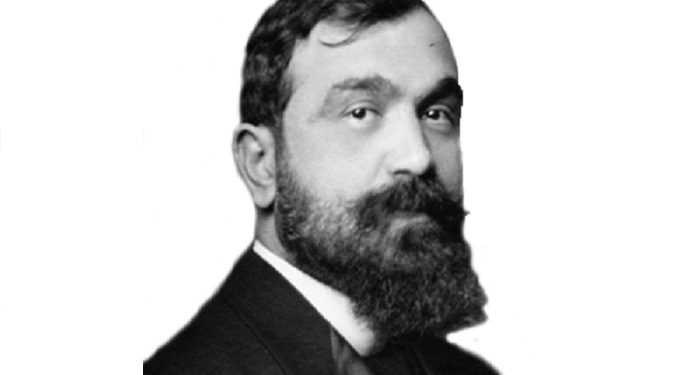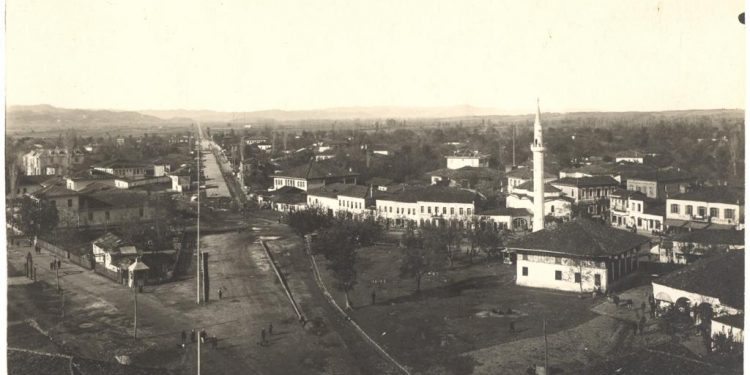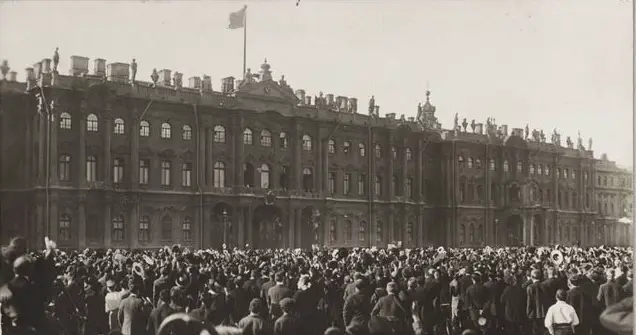Dashnor Kaloçi
Memorie.al publishes the unknown story of a Tirana intellectual, Reshat Këlliçi, the sucker of one of the famed families, where her ancestors, like Mytesim and Masar Këlliçi, after graduating from Istanbul universities, responded to the call in 1912 of Ismail Qemali and returned home to contribute to the formation of the new Albanian state.
Reshat Këlliçi’s close friendship with the young man from Vlora, Avni Rustemi, while studying in Calabria, where they also met the nephew of the famous National Renaissance poet Jeronim De Rada, who sought to sell his grandfather’s manuscripts for earn any money. Return of Reshat to Albania in 1920, where he engaged in politics with the “Union” Society run by his close friend, Avni Rustemi, running the “Union” newspaper and leaving Albania after Zog’s coming to power, emigrating to the Soviet Union where he stayed until 1936 majoring in Political Science.
Returning to Albania after fascist Italy’s invasion of Albania after being disillusioned with the ‘communist doctrine’ and the reality he had seen with his own eyes in Lenin and Stalin’s homeland, which made him never become a communist and he was ignored by the communist regime until he closed his eyes in 1966, under the care of his friend, Sejfulla Maleshova, who was allowed to attend his ideal friend’s funeral from his youth!
From Istanbul to Tirana after the call of Ismail Qemali
Reshat Këlliçi was born in Istanbul in 1901, where, after leaving Tirana, his family was made up of intellectuals, senior civil servants. The autochthonous Kilian family in Tyranny was located in the capital of the Ottoman Empire there in the early 1890s. Reshat’s father, Masar Kellici, completed his studies in Theology in the Turkish capital, where he had frequent contacts with other tyrannical patriots, such as Seremedin, Refik and Abdi Toptani, who prepared and printed Albanian books that were secretly sent to Albania. After graduating from the theological school, Masari, along with his brother Mytesin, worked for some time in the Bursa and Izmir customs. In 1912, after the declaration of independence, when Ismail Bey Qemali called on all Albanian intellectuals who were outside Albania to return home to contribute to the construction of the new state, the Kelici family responded first. that call, he returned to Tirana. Masar Kelliçi, around 1920, was elected as the head of the Islamic Community for Tirana. Also seeing his patriotic contribution during his years in Istanbul, on April 21, 1921, Masari was elected deputy of Tirana to the first Albanian Parliament. Before Masari devoted himself to politics, his brother Mytsini, the Mufti of Tirana, was one of the initiators and participants of the Lushnja Congress.
Reshati roommate with Avni Rustemi in Calabria
Masari’s son, Reshat Kellici, after finishing elementary school in Istanbul, returning to Tirana, was sent by the family to continue high school in St. Miter Korona, Calabria. At that school where the great Renaissance poet Jeronim De Rada, Reshati, taught, he became acquainted and made a close friendship with his compatriot, Avni Rustem, for whom he would express gratitude and respect all his life. In this connection, in his memoirs, among other things, Reshat writes: “I have been acquainted with Avni since the end of October 1919. Avni had come to take the Matura exams in the Normal branch of the school of this village of the Arberesh of Calabria, where they came to teach boys from all over Albania. He approached me, loved me, and became close friends from day one. I loved it with all my heart. He was wise and very kind and we both lived together in a room we had occupied in the home of Arberesia Maria Antonia, who loved us so much that we were regular boys. ” During their years of study in Calabria, Reshati, along with Avni Rustem, went and visited the De Rada family home in Makia village, not far from Saint-Miter. Regarding this visit to the house of the famous National Renaissance potter, in his memoirs, Reshati writes: “It was a small house of a poor peasant-like, a cartoon to say where he was born, where he had suffered and where had frozen his poor life. Avni talked to me a lot about this great son of the Arberes of Italy, about this Albanian poet, who loved him with a passionate passion for his true motherland, who had him face to face across the sea. In that house we found the poet’s nephew, who had fallen out of duality. We talked with her a long time to find out more about De Rada’s life. He told us that the poet had left some precious manuscripts which he carefully guarded and told us that he would one day sell them for a living to earn some money. We were very sorry that even the poet’s nephew suffered as much as his uncle had suffered”.
Director of the newspaper “Bashkimi”
After finishing high school in Saint-Miter, Calabria, there in July 1923, Reshat returned to Albania and once again engaged in politics by joining the wing of Ahmet Zog’s opponents, or otherwise known as “spouses”. , who were grouped in the “Union” society, which was headed by his close friend, Avni Rustemi. At that time, the company “Union”, which was joined by Sejfulla Maleshova, Tajar Zavalani, Reshit Daci, Naum Prifti, etc., at the beginning of 1924, also published its newspaper of the same name, whose director was appointed Reshat Kelici… When he started running that newspaper, Reshati also became acquainted with Fan Noli, Luigj Gurakuqi, Bajram Curr, Stavro Vinjah, etc., who were also the inspiration of the “Union” society, which prepared the armed uprising or as it is known as “June Revolution”. “. Concerning the publication of the newspaper “Bashkimi”, in his memoirs, among other things, Reshati wrote: “Finally, after being provided with the blessed fund, our organization set out to devise its own body to spread revolutionary ideas. , according to the program that Avni Rustemi himself had devised since he was in Rome after the assassination of Esat Toptani. At that time in Albania, some newspapers published different political views, such as the “Clock of the Mountains” in Shkodra, which was the organ of the Catholic Clergy and the anti-clerical “Republic”. Likewise the “Dajti” in Tirana, which was brought out by Ibrahim Dalliu, who later entered into a controversy with our newspaper, which called this newspaper “Dajti with Jube”, the “Takhteh Shelter”, that really started in this newspaper. to write with nicknames or their real names, some elusive elders, who did not like our new ideas. Our newspaper had as much life as the Noli government. Despite the alliance we had with that government, we often criticized it harshly. ”
Këlliçi publicist
At the time Reshat ran the “Bashkimi” newspaper, besides pens that were constantly written there, such as Sejfulla Maleshova, (literally nicknamed Lame Kodra) Zai Fundo, Tajar Zavalani, Zoi Xoxe, Haki Stermilli, Selim Shpuza, and others, he himself wrote most of the articles and editorials that were directly related to government policy, addressing the problems they thought were the sharpest of the day. In that first issue of July 8, 1924, in an article titled “Our Program”, Reshat Kelici wrote, among other things: “Today we celebrate the triumph of democracy in the free capital of Albania. Today, the “Union” society awaits the establishment of true democracy, whose preservation should never be trusted by feudal lords and pseudo patriots. It awaits the punishment, the exemplary punishment of the perpetrators of the fratricide and the payment of the wealth of all these costs and material damages suffered by the state and the people. ” In another article in the “Bashkimi” newspaper, dated September 20, 1924, among other things, Reshati writes: “The people with slow measures do not believe that the feudal regime in Albania ended. The government in which we had great confidence that it would realize the high principles and ideals that led all the people to their feet, alas we do not know that it was left at the beginning of the road. Following the failure of Fan Noli’s rule, which came to power after forcibly overthrowing Shefqet Vërlaci’s legitimate government, where Ahmet Zog held the post of interior minister, the Union newspaper, which was its main protector, fell out with the Nolist government. , during those six months that they were in power.
Emigrates to the Soviet Union
After the top leaders of Fan Noli’s government, led by him in late December 1924, left Albania with Ahmet Zog’s reappearance, Reshat left with them and emigrated to the Soviet Union. In the great communist empire, Reshat went as a political expatriate along with some other “fellow” comrades such as Tajar Zavalani, Sejfulla Maleshova, Reshit Daci, Naum Prifti, etc., who, being idealists, thought that they were at home. of Lenin, a true democratic society would be built. Reshat stayed in the Soviet Union from 1924 until 1936, where he worked for several years and then studied Political Science and two years at a military academy in Petersburg. Although he attended Russian schools, he never became a Marxist. This is proved by his writings from the early 1930s, where among others he wrote: “In the western democratic states, you can fearlessly criticize the prime minister himself, while in Russia he was afraid to think of anything. such “. Although Reshat stayed in the Soviet Union for nearly 12 years, he was disappointed by Russian reality when he saw with his own eyes that the country propagating democracy was nothing more than a vicious dictatorship, where Stalin had turned it into a great prison of peoples. It was for this reason that Zai Fundo and Tajar Zavalan abandoned Communist ideals after a few years when they returned to Albania. And for many years after his return from the Soviet Union, Reshat Kelliiç and Seyfull Maleshevo fueled illusions that communism would have a future in their homeland. But they were disappointed, too, only after the war ended when the Communists came to power.
It flees the Communists, fights against them
After nearly 12 years of staying in the vast empire of communism, Reshati returned to Albania there in 1936, disillusioned with communist ideas. At that time he married Bedia Sulo of Libohova, who was the daughter of Dervish Sulo, President of the Court of Dictation (Supreme Court), who was then studying at the American Technical School of Golem. At that time, Reshati gave up politics and only worked on his own, where he worked as an accountant at the Stamles Cigarette Factory in Durres from 1936. Likewise, during the years of the occupation (1939-1944) he remained a bit alienated from the War, though he was deeply anti-fascist. The Communists at the time shot their sister’s husband, Akil Sakiqi, (a former soldier of the Zog Monarchy), and Reshat himself was badly seen by them, as he had a distressed son, the Prefect of Tirana, Qazim Mulleti, and an aunt’s son, a former -The Prefect of Durres, Rexhep Jella. After the war, Reshat worked for some time at the National Bank and at the Dajti Hotel and continued his close association with his old friend, Sejfulla Maleshova, who was then excluded from all party and state functions, from which he would be dismissed. Reshat himself suffered, dismissing him. Although Reshat suffered from the friendship he had with Maleshova, he never abandoned it even when, in 1950, he was personally called upon by Kadri Hazbiu to renounce his association with Lame Hill. After that, he barely managed to get a job as a teacher of Russian for some time and then ended up as a literary proofreader at Naim Frasheri Publishing House, though he knew some foreign languages very well. Although he had studied for many years in the Soviet Union, Reshat not only never became a Communist but fought them until he died in 1966. In the final days of his life, his ideal companion stood on his head. , Sejfulla Maleshova, who was not allowed to attend the funeral of Kellici. Memorie.al













